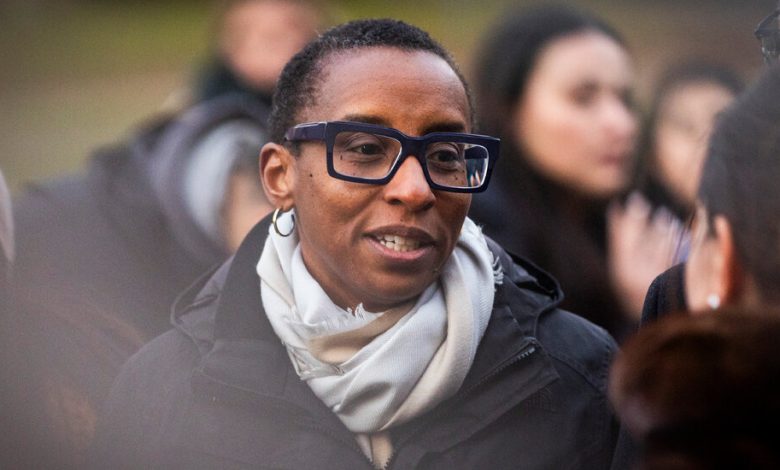The Word That Undid Claudine Gay

In retrospect, Claudine Gay’s fate was sealed by a single word. (She resigned the presidency of Harvard on Tuesday, just six months into her tenure.) It wasn’t “plagiarism” or “genocide” — the fearsome fighting words most publicly associated with her case — but rather a careful, neutral piece of language that struck some listeners as outrageous for precisely that reason: an attempt at anti-inflammatory rhetoric that had the opposite effect. The word was “context.”
Testifying at a congressional hearing in early December with two other university presidents — only one of whom, Sally Kornbluth of M.I.T., still has her job — she was asked by Representative Elise Stefanik (Republican of New York; Harvard ’06) whether “calling for the genocide of Jews” violated “Harvard’s rules of bullying and harassment.” Dr. Gay replied that it might, “depending on the context,” a formulation she reiterated when Ms. Stefanik rephrased the question. Dr. Gay later apologized for those remarks, but they had already entered the media bloodstream, making her and her fellow witnesses an overnight meme representing the insensitivity and cluelessness of elite academic leadership.
Now that Dr. Gay is out (following M. Elizabeth Magill of the University of Pennsylvania, who resigned shortly after the hearing), there is more than enough context to go around. Her career, until last July a steady, brisk climb through faculty and administrative ranks to the pinnacle of American higher education, has become a punditic bonanza and a culture-war Rorschach test.
Those who believe that the modern university is tyrannized by left-wing ideology and undermined by diversity initiatives have been quick to elevate Dr. Gay into a symbol of systemic dysfunction. For her defenders, she looks more like a scapegoat, arguably the most prominent casualty in a long conservative crusade against the intellectual establishment. Ms. Stefanik and Christopher Rufo, the right-wing activist who pushed the allegations of scholarly misconduct that finally precipitated Dr. Gay’s exit, might not disagree with that assessment. “I will always deliver results,” Ms. Stefanik said in a statement on Tuesday, promising to continue her efforts to “expose the rot” in America’s leading universities.
The Israel-Hamas conflict and American election-year politics are not the only salient context here. Academia seems to be in the grip of a multidimensional crisis that goes beyond ideology, and also beyond Harvard. Higher learning is plagued by opaque admissions policies; runaway tuition costs; administrative bloat; grade inflation; helicopter parents; cancel culture. The list goes on. An assiduous scholar might connect these phenomena with recent events in Harvard Yard. An enterprising writer could weave the whole thing into a bristling campus novel, something worthy of Paul Beatty or Mary McCarthy.
Instead, for now, we will have to make do with Dr. Gay’s letter of resignation — emailed to students, faculty, alumni and others with the subject line “Personal News” — and the message from the Harvard Corporation (the university’s secretive governing body) about her departure.
What is most striking about these texts — each amounting to little more than 600 words, all of them carefully measured, few of them memorable — is their rigorous avoidance of context. No mention is made of Congress, or Gaza, or anything that might actually explain what happened. “We live in difficult and troubling times,” the corporation’s letter asserts, “and formidable challenges lie ahead.” The nature of the trouble is mainly left unspoken, in keeping with an overall commitment to abstraction, as if bland, nonspecific language could wash away the difficulty. It’s only when the letters note what the corporation calls the “repugnant and in some cases racist vitriol” Dr. Gay faced as Harvard’s first Black president that they register some of the rawness and rage of contemporary reality.
Otherwise, the sole concrete reference — virtually the only proper noun — in either letter is Harvard. Dr. Gay opens hers with an affirmation of her “deep love for Harvard,” while the corporation expresses Harvard’s inexhaustible regard for itself. Perhaps that’s to be expected of an institution reeling from a public-relations catastrophe; its dutiful defense of its fallen president — as “a leader, a teacher, a scholar, a mentor and an inspiration to many” — is also in keeping with the demands of the moment and the genre.
What’s curious, though, is that Harvard, which compels its undergraduates to master expository writing in their freshman year, cannot find the language to defend itself. The corporation does not apologize or explain. Instead, it throws up its hands in prayer: “May our community, with its long history of rising through change and through storm, find new ways to meet those challenges together, and to affirm Harvard’s commitment to generating knowledge, pursuing truth and contributing through scholarship and education to a better world.”
The clouds of mystification gather early. Can a nearly 400-year-old entity that began as a seminary for young Protestant men and grew into a global educational brand with a $50 billion endowment be said in any meaningful sense to constitute a community? The sentence then succumbs to a storm of clattering prose and conceptual incoherence. It’s hard to know just what or how many things Harvard is committed to, or what new ways of affirming that commitment might be found.
Dr. Gay’s letter expresses personal anguish rather than institutional embarrassment, which makes it a more cogent document. It’s hard not to be moved by her loyalty to Harvard, partly because rather than invoking an imaginary trans-historical community, she places her faith concretely in “the people of Harvard.” But how those people might realize “the possibility and the promise of a better future” — what the corporation, falling into management-speak, calls the “mission” — is something of a puzzle.
“These last weeks,” Dr. Gay writes, “have helped make clear the work we need to do to build that future — to combat bias and hate in all its forms, to create a learning environment in which we respect each other’s dignity and treat one another with compassion, and to affirm our enduring commitment to open inquiry and free expression in the pursuit of truth.” This sentence echoes the Harvard Corporation’s gusty roster of commitments, improving the syntax and the prose rhythm. Those infinitives stack up nicely. It sounds like a lot of work, but how can anyone be against any of it?
The real question, though, is how one institution can be for all of it. Is this work the university is really equipped to do? Combating bias may involve constraining open inquiry; free expression is not always respectful or compassionate. The pursuit of truth may outrun everything else. This cascade of noble imperatives can be read descriptively, as a diagnosis of the causes of campus turmoil. What is presented as a list of unimpeachable virtues and laudable goals is in practice a web of contradictions.
It’s not a web that Dr. Gay spun. The sentence, after all, is hardly original; it’s a list of commonplaces, the kind of high-minded assertion of consensus that a university president is expected to deliver, and perhaps even to believe. Can anyone else believe in it? That depends on the context.




